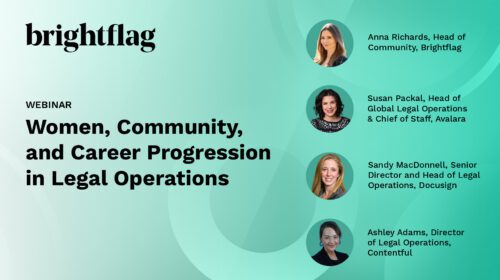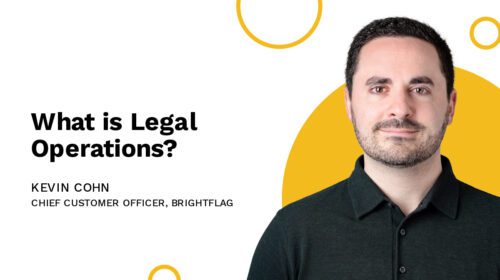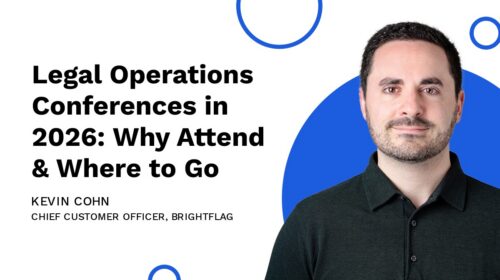Creating an Award-Winning Legal Operations Function
What does it take to create an award-winning legal ops function?
If anyone knows, it’s Letitia Haynes-Frasier.
Letitia has built legal operations functions from the ground up at Cox Media Group and has deep expertise in spend management from her time as a law firm billing coordinator.
She also recently received a 2024 American Lawyer Industry Award for the Best Legal Ops Team in recognition of her work at Cox Media Group—beating some stiff competition for the coveted legal operations award.
We sat down with Letitia to get her top tips and lessons learned from creating an award-winning legal ops function.
Tell us about your journey to winning this legal operations award.
Letitia: It all started last year, when the business requested that we improve the way we stored contracts. At the time, I saw an opportunity to satisfy this request while at the same time making a more fundamental change to how we managed contracts to create greater efficiency.
I had to convince my GC, Eric Greenberg, and company leadership that biting off this bigger chunk of work was the right approach. So, I presented my case to them, and they trusted me to take it forward. I designed and implemented a new process for contract review and storage that improved workflows and provided greater visibility.
It was a big lift for me, but it paid off. As part of that project, we saved the company upwards of $400,000.
I didn’t think at the time that I was doing anything worthy of a legal operations award, but I was happy to do it and it’s made a big difference in how we work.
Eric, on the other hand, thought otherwise. And I guess the judges agreed that it was award-worthy!
What an amazing achievement! I guess sometimes it takes someone like your GC holding up a mirror to really see how far you’ve come.
You seem to have built a very strong partnership with your GC. What do you think are the key elements of a strong legal ops-GC relationship?
To me, the key elements are communication and trust.
When Eric first joined Cox Media Group, Eric and I went through a learning period. We communicated about Eric’s expectations for the legal ops function, my expectations for it, and my relationship with him as the GC. I realized that Eric’s expectations of me and for the legal operations were higher than my own. He expected a thought leader and advisor, and I was limiting myself to just providing support. That helped a lot in aligning our expectations at the outset and helped push the bounds of what legal ops could do at the company.
Then once we worked on our first project together, the mutual trust and respect really started to strengthen. We continued to communicate about our different ideas and plans for the project, and ultimately, the project was a great success. And we just kept building from there.
We still communicate frequently, whether it’s through our regularly scheduled meetings or a quick ‘Hey, you got a minute?’ chat.
So building our partnership through frequent communication, and developing mutual trust through collaboration has really worked for us.
Sounds like a recipe for success! Speaking of delivering on projects, like many other legal ops professionals, you’re a legal ops team of one. How do you juggle different priorities and make sure you’re progressing with the most impactful items?
It can be a struggle to manage all the different priorities.
I remember going to a CLOC session where someone said to think about the low-hanging fruit or easy, one-off fixes that you can do while progressing those bigger projects that take longer.
I think that’s great advice because when I hear attorneys talk about something that’s bothering them, or start sentences with ‘I wish…’, I often think of ways that I can fix their issue to help the team be more efficient.
On the other hand, as a team of one, those bigger, high-impact projects can take up a lot of time. I act as the project manager, solution designer, IT manager, and change manager all at once, which is a lot of work for one person.
For bigger projects, I find that setting deadlines for when I want the project operational keeps me motivated to strive for completion. It also helps me communicate my priorities to others. Of course, sometimes deadlines can shift around, but I find it helps to have clear milestones to work towards.
Trying to balance those quick wins and the bigger items makes a lot of sense.
One piece of advice we give legal ops teams is to lean on their legal tech vendors. They can act as an extension of your team and help you get more done. What’s your advice for legal teams to get more value from their relationships with their vendors?
Again, I think that it comes back to communication.
What Brightflag does really well is they proactively communicate with customers about what new features are coming and about existing features that could help us work more efficiently. My Customer Success Manager, Ethan, is always one step ahead of me, thinking about the next piece of functionality that will help us improve. So, having a vendor that proactively communicates and is really invested in your success helps.
But for other vendors who may not be quite as proactive, you can reach out to them and ask them what new features they have coming, and request demos of what’s new to make sure you’re using the tool to its full potential.
Apart from leveraging your legal tech vendors, you’ve also created a very effective outside counsel management program. How did you go about doing that?
In the 20+ years I spent in law firm billing, I saw the good, the bad, and the ugly. So when I started out in legal ops, I knew how I wanted to manage the outside counsel spend and encourage good behaviors.
To be honest, I took quite a hardline approach because I saw the things that can be missed in law firm billing and wanted to safeguard us against those pitfalls.
However, Eric was more focused on developing strong relationships with our outside counsel. He showed me that I could take a relationship–based approach and still get the visibility into spend and the billing hygiene that I needed.
So, I began to offer my time to our outside counsel for training sessions on our billing requirements and explanations of why we needed our invoices and accruals submitted on time and with certain requirements met.
It seems like partnering closely with outside counsel has brought you great success. I know that you’ve also created a strong partnership with your finance team. How can legal work best with finance?
Ultimately, finance has a duty to ensure the business is operating in a financially prudent manner. And as a budget holder, legal has a duty to responsibly manage legal spending. But we don’t need to try to achieve each of these things in a vacuum. Personally, I’ve found that finance is happy to go above and beyond in helping me manage my budget, and I try to do the same to help them be successful.
We meet monthly to review our numbers and find and correct errors, such as items that need to be billed to different cost centers. So, we’ve developed this great partnership where we share information. I provide explanations as to why our numbers are the way they are, and then when my finance partners are meeting with their own leadership, they can explain what’s going on with legal.
I’m happy to help them with this, and they in turn help me. We’ve built a relationship where we can rely upon each other, and I think that makes both functions stronger.
Trust, communication, collaboration, and partnership. Words of wisdom to live by. Thanks so much Letitia, and congratulations again on the well-deserved legal operations award!


